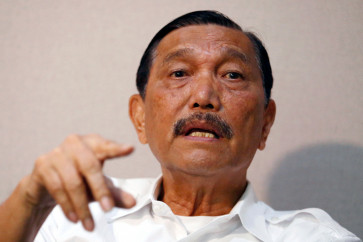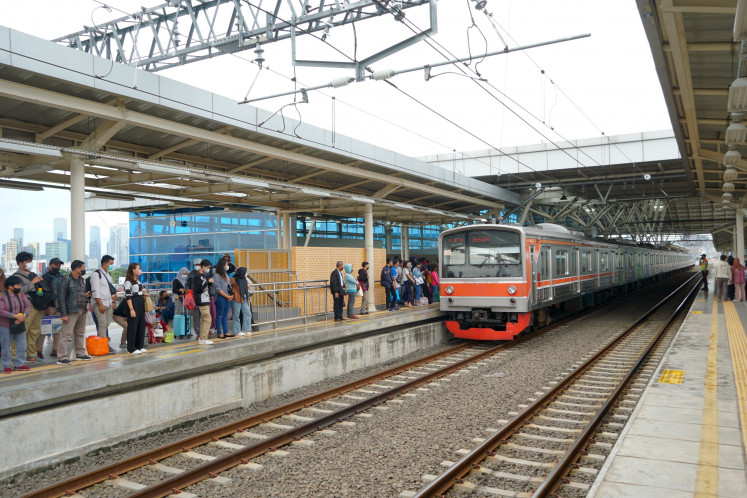China and Southeast Asia: Remaking history
When Chinese Premier Wen Jiabao makes his first trip to Indonesia this April, he will beat US President Barack Obama (who has postponed his March trip to June) to the Association of Southeast Asian Nations’ (ASEAN) largest country
Change Size

W
hen Chinese Premier Wen Jiabao makes his first trip to Indonesia this April, he will beat US President Barack Obama (who has postponed his March trip to June) to the Association of Southeast Asian Nations’ (ASEAN) largest country. Premier Wen’s trip is important, not only in contrast to President Obama’s non-trip but also in underlining China’s deep historical links with the region.
Indonesia — and the rest of ASEAN — is watching China in a global context where the financial crisis has revealed the limits of America’s power. By contrast, China is rising and sharing its prosperity with friends.
Ever since China’s opening to the world in the late 1970s — but particularly since the end of the Cold War when it rejoined the global economy — China changed not only itself but also the rest of the world. China’s rising profile has to do with historical as well as economic factors. That history is being remade today. When Premier Wen comes to Indonesia, he will bring with him tidings of history being remade.
If President Obama’s visit was important in terms of his personal nostalgia for Indonesia, Premier Wen’s visit represents China’s nostalgia for Southeast Asia, which used to be known as “Nanyang” — the Southern Seas that constitute the outer reaches of China’s maritime periphery.
China’s influence was felt keenly in the Nanyang in the pre-colonial era. Chinese migration and settlement in the region created lasting international networks of trade and influence. The great naval voyages of Admiral Zheng from imperial China to Africa through the Nanyang made the region an essential and immediate part of China’s global aspirations.
The tributary system embodied a regional order in which countries on China’s periphery offered tribute at its courts in return for gifts that exceeded in value what they had paid by way of tribute. More importantly, these countries won China’s protection.
The intrusion of European colonial capital, followed by state power, into Southeast Asia sometimes used these existing Chinese networks of trade to create new international networks, but generally European colonialism supplanted China’s imperial influence in the region and, with it, the tradition of Chinese largesse that had characterized the tributary system.
With the Opium Wars, China itself came under Western attack. Although it was not colonized, it was no longer an independent player. The emergence of the People’s Republic of China in 1949 ushered in a new era of China’s relations with Southeast Asia. Unfortunately, Chinese support for insurgent communist movements in the region, in which local Chinese played a leading role, squandered the gains that Beijing could have made. Instead, non-communist Southeast Asian nations looked to Beijing with a mixture of suspicion and apprehension.
They drew close to the West, especially the United States, for the same reason. It was the emergence of Deng Xiaoping as the most powerful person in China after the death of Mao Zedong that led to China re-enter the global system, no longer as a revisionist power but now as a status quo power.
China reshaped the system from within.
Frankly, however, there are real concerns about China’s current rise in Southeast Asia. These concerns do not relate to what a rising China is doing today — because China is behaving like a benign power — but what it could do once it is powerful enough to call the shots in the region largely by itself. Here, my approach to China lies in giving it an incentive to continue behaving in a benign way. Let’s elaborate.
Questions are often asked about whether China is a status-quo power or a revisionist power.
The problem with such questions is that it is very difficult to define a status-quo power satisfactorily.
Consider the United States. Its benign hegemony underpins the global order to a large extent; correspondingly it is the main benefactor of the global status quo.
However, it did not hesitate to behave like a revisionist power when it invaded Iraq in pursuit of the larger purpose of redrawing the map of the Middle East to make Islam friendly to democracy. By contrast, China is a revisionist power to the extent that its vision of itself as Asia’s eventually preponderant power must entail the curtailment of some American influence in the continent, including in Southeast Asia.
China does not seek to achieve this status militarily. It is a status-quo power in the sense that it hopes to benefit peacefully from Asia’s changing economic and political map. It is an ambitious power,
but its intentions are not align. Hence, Asians, including those in the Nanyang, must do everything in their power to facilitate China’s peaceful rise.
We must give China an incentive to remain benign. Not everyone will share my optimism. To them, I offer this thought: Fear not.
Rising powers that begin to behave suspiciously create balancing, if not opposing, constellations around them. Southeast Asian countries will move towards a hedging strategy should a rising China
become a more muscular China. The presence in Asia of the United States, its treaty relationships with Japan and South Korea, and its growing ties with several other nations make the hedging strategy a viable one.
All this said, the crux of the matter lies in the fact that although Southeast Asian nations are wary of the possibility that Beijing will treat maritime Nanyang as a Chinese lake one day, they are equally wary of any attempt, by any country, to encircle China strategically.
Any attempt to try and make Indonesia, for example, a component of the containment of China will fail, particularly if that containment is directed against Beijing’s legitimate interests in the Taiwan Straits. The One-China policy remains the bedrock of stability, peace and prosperity in Northeast Asia, a region whose balance of power impinges on the balance of power in Southeast Asia as well.
On balance, the so-called China threat theory needs to be discarded. China should be given the benefit of the doubt as it takes its place at the table of the great powers. The stakes are high for Southeast Asia. A China that is a leading player, and therefore a major stakeholder, in the Asian Century will help to translate Asian dreams into reality. A China that is thwarted by jealous powers will turn Asian dreams into nightmares. The choice is ours, right here in the Nanyang.
The writer is deputy chairman of the Indonesian Chamber of Commerce and Industry (Kadin). The Stanford-trained businessman is also the CEO of Bakrie Telecom, and heads two national TV stations, ANTV and TV One.









